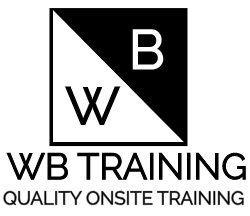We Provide On-site Overhead Crane Training
WB Training offer on site, in house and RTITB accredited overhead crane training. The training course will be provided by a registered, fully insured training instructor. During the course operators will learn how to operate the overhead crane safely, importance of crane pre use checks, basic lifting plans and safe lifting techniques. We will also cover signalling and slinging as part of the course.

What is covered during an overhead crane course?
An overhead crane training course typically covers a range of topics to ensure that individuals operating or working with overhead cranes have the necessary knowledge and skills to do so safely and effectively. Here is what’s covered during the course.
- Introduction to Overhead Cranes:
- Overview of different types of overhead cranes.
- Components and parts of an overhead crane.
- Safety Regulations and Standards:
- Understanding standards and guidelines for overhead crane operation.
- Risk Assessment:
- Identifying potential hazards associated with overhead crane operation.
- Methods for assessing and mitigating risks.
- Pre-Use Inspection:
- Conducting pre-use checks and inspections of the crane and its components.
- Recognizing signs of wear, damage, or malfunction.
- Basic Crane Controls:
- Understanding the functions of controls such as hoist, trolley, and bridge.
- Practice in operating controls safely.
- Load Handling and Rigging:
- Proper techniques for lifting and moving loads.
- Rigging principles and best practices.
- Load Charts:
- Interpretation of load charts and capacity ratings.
- Determining safe working loads.
- Communication:
- Effective communication between overhead crane operators and other personnel.
- Hand signals and other communication methods.
- Emergency Procedures:
- Response to emergencies and contingencies.
- Evacuation procedures.
- Maintenance and Troubleshooting:
- Basic maintenance tasks and schedules.
- Troubleshooting common issues with the crane.
- Operator Responsibilities:
- Understanding the responsibilities of an overhead crane operator.
- Following protocols and procedures.
- Practical Training:
- Hands-on training with an actual overhead crane.
- Simulation exercises to practice safe operation.
It’s important to note that specific overhead crane training course content may vary, and individuals may need to undergo additional training based on the type of crane they operate and the specific requirements of their workplace.
Why is overhead crane training required in the UK?
Overhead crane training is required in the UK, as well as in many other countries, for several important reasons:

- Safety: Overhead cranes are powerful and complex pieces of equipment used for lifting and moving heavy loads. Operating them without proper training can pose significant risks to the safety of both the crane operator and those working in the vicinity. Training ensures that operators are aware of safety protocols, procedures, and best practices to minimize the risk of accidents and injuries.
- Legal Compliance: Health and safety regulations in the UK, such as those set forth by the Health and Safety Executive (HSE), mandate that employers provide adequate training for employees who operate specific types of machinery, including overhead cranes. Failure to comply with these regulations can result in legal consequences, fines, and potential liability for employers.
- Efficiency and Productivity: Properly trained crane operators are more efficient and productive in their work. They can handle loads with precision, reducing the risk of damage to materials and equipment. This efficiency contributes to the overall productivity of the workplace.
- Equipment Maintenance: Crane operators are often trained not only in the operation of the equipment but also in basic maintenance procedures. This knowledge helps ensure that the cranes are properly maintained, reducing the likelihood of mechanical failures that could lead to accidents.
- Risk Reduction: Overhead cranes are used in various industries, including manufacturing, construction, and logistics, where the risks associated with lifting and moving heavy loads are significant. Training helps operators identify potential hazards, assess risks, and take appropriate measures to mitigate them.
Overall, overhead crane training is essential to create a safer working environment, ensure legal compliance, and promote efficient and responsible use of this heavy machinery in industrial settings.
CALL US – 01902 479991 / 07305098558
EMAIL – wbtraining1@hotmail.com
Course Prices PRICE MATCH GUARANTEE
Duration: 3.25 hours to 7.5 hours. (Depending on course type and number of candidates)
Price Per Day: £200.00*
Max Number Of Candidates: 4
Contact us for more info.
Click HERE for price list page.
Please read WB Training Terms and Conditions, before making a booking.
Contact Us HERE.
